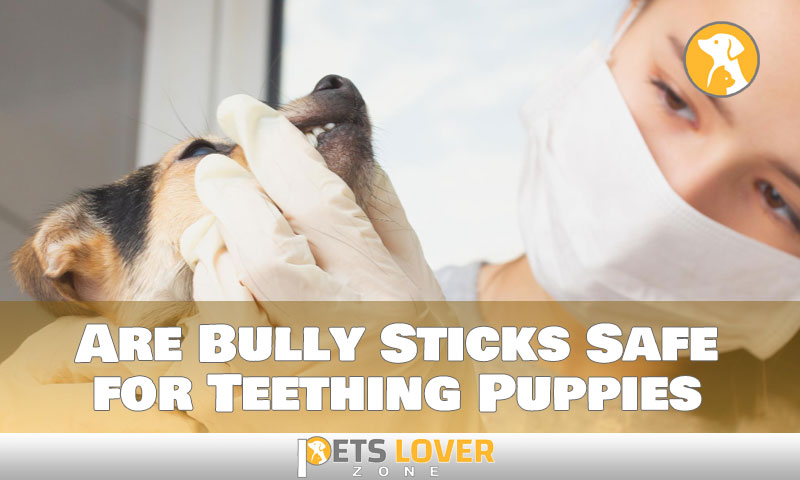Have you ever wondered if bully sticks are safe for puppies? If so, you’re not alone. After all, when it comes to buying chew toys for our beloved little pooches, safety is always the first priority.
When it comes to teething puppies, bully sticks are a popular choice — and with good reason. There’s a lot to be said about the protein-packed treat and its ability to keep a puppy entertained in moments of teething angst. But it’s important to know exactly what’s in them, where they come from, and how safe they really are for our furry four-legged friends before you buy that next packet of bully sticks for your dog.
In this article, I’ll explore all of these questions in an effort to determine the truth about bully sticks. Are they really safe for our teething pups? Let’s find out.
What Are Bully Sticks and How Are They Made?
You may have heard people talk about bully sticks as a go-to teething toy for their new puppies. But what are they really, and how are they made?
Bully sticks, also known as pizzles or penis muscles from a bull, are made from beef or steer penis. The penis is stretched and twisted before it is dried out through methods like dehydration, baking, smoking, or irradiation. This makes the bully sticks tough and chewy, which makes them ideal for dogs to chew on during teething.
Plus, bully sticks contain essential proteins like fatty acids to give them an extra delicious boost for your pup’s taste buds. Many pet owners also report that bully sticks are odor-free so you don’t have to worry about their presence stinking up the house.
The Pros of Bully Sticks for Teething Puppies
Choosing the right chew option for your teething pup can be a difficult decision. But bully sticks may just be the perfect solution. Used responsibly, bully sticks can offer a range of benefits to your teething pup.
For starters, they can help promote healthy bones, joints, and muscles due to their high content of proteins and vitamins. They also provide dental health benefits, as chewing on bully sticks can help massage your pup’s gums and remove plaque from the surfaces of its teeth.
Additionally, chewing on bully sticks can provide mental stimulation for your pup and help reduce their stress levels and anxiety. Not only does it keep them busy for hours on end, but it also gives them a sense of accomplishment that can carry over into other aspects of their behavior.
Ultimately, bully sticks are not only safe for teething puppies; they also offer plenty of benefits that make them worth considering.
The Potential Dangers of Bully Sticks for Puppies
Though they may seem like a safe alternative to rawhide chews, bully sticks are not without risk for teething puppies. The main danger associated with them is bacterial contamination and the possibility of choking. Let’s take a closer look at each potential hazard.
Bacterial Contamination
The biggest threat that comes along with using bully sticks is the potential for bacterial contamination. Because they’re made with animal byproducts, bacteria can cause serious health risks if introduced in large quantities. To prevent this, it’s important to buy from a reputable manufacturer and make sure that the sticks you’re buying have been tested and approved for use as dog chew treats.
Choking Risk
As with any chew toy, there is always a risk of choking, especially for smaller dogs and young puppies. When choosing bully sticks, opt for those with pin-locking technology, which helps secure the bully stick and provide long-lasting chew time while still allowing the stick to be 100% digestible if swallowed.
Choking Hazard: Can Puppies Choke on Bully Sticks?
Your teething puppy loves to chew, but have you ever thought about what happens when he tries to swallow a bully stick? Bully sticks can become a choking hazard when the size is small enough for your pup to swallow whole, and they should be supervised at all times.
When a puppy swallows a bully stick, the consequences can range from IV fluids and antibiotics to emergency life-saving surgery, depending on the severity of the situation. Even if the bully stick is too big for your pup to swallow whole, it can still create an obstruction in his digestive tract. If this occurs, your puppy will need endoscopic or surgical intervention to remove it.
That’s why it’s important to ensure you pick the right size bully sticks for your pup. Here are some tips:
- Stick with sizes less than 6 inches long for teething puppies.
- Check the packaging label—it should list the size of each bully stick.
- Try breaking off small pieces of the bully stick at first and slowly increasing its size as your pup grows.
- Always supervise your pup when they are playing and chewing.
Potential Dangers of Bully Sticks for Teething Puppies
If you’re considering giving a bully stick to your teething puppy, you know that it’s natural and edible. But there are some potential dangers that you need to be aware of.
Choking Hazard
Unfortunately, bully sticks can be a choking hazard if they’re not consumed properly. It’s important to make sure the bully stick is the right size for your puppy—otherwise, they could easily swallow it whole and choke. So make sure to get an appropriately-sized bully stick for your dog.
Splintering
Another potential danger with bully sticks is that they can splinter when chewed on. This can be dangerous for puppies, as the splinters have sharp edges and can cause serious damage or discomfort in the mouth.
Health Hazard
Finally, there’s always a risk of bacterial or parasitic contamination with any treatment you give to your pet, including bully sticks. So you should check with your vet to make sure that the bully sticks you’re planning on giving your pups are safe and free from potential health hazards before feeding them.
Gastrointestinal Issues: Can Bully Sticks Cause Diarrhea or Stomach Upset?
It is true that the richness of bully sticks can cause gastrointestinal issues like diarrhea or an upset stomach, but this isn’t necessarily always the case. The big factor here is how used to these proteins your pup is. If you have a pup that’s not used to digesting such large amounts of protein, certain proteins in the bully stick may cause them to have an upset stomach or even diarrhea.
It’s also possible for bully sticks to introduce bacterial contamination, which would then cause diarrhea, but only if the bully stick has not been stored or processed correctly. That’s why it’s important to make sure you’re buying good quality bully sticks from a reputable source that follows all health and safety regulations. Otherwise, your pup could get a nasty case of the runs!
Safely Giving Bully Sticks to Your Teething Puppy
Giving bully sticks to your teething puppy is a great way to keep them occupied and help relieve some of the discomforts they feel. When choosing a bully stick, it’s important to make sure it’s not too big—make sure it’s about the same length as your puppy’s head.
By chewing on the bully stick, you’re helping clean your pup’s teeth and massage their gums—which are both super important when it comes to teething. Just make sure you’re not allowing them to chew for too long at a time—10-15 minutes should do the trick.
Finally, if your pup is having trouble getting into the bully stick, you can try lightly wetting the end with water or broth—just don’t leave it in for more than 5 minutes. With these tips, you’ll be able to give your puppy bully sticks with confidence.
Are Bully Sticks Digestible and Safe for Sensitive Stomachs?
Curious to know if bully sticks are safe for teething puppies, especially those with sensitive stomachs? We feel your pain.
We can assure you that bully sticks are highly digestible and easily break down in the stomach. This is great news because it means they won’t cause any blockages in sensitive tummies, build up excess gas, or cause other nasty digestive issues. Plus, they’re a high-protein treat, which is excellent for your growing pup but can cause an upset stomach if he’s not used to digesting such high amounts.
So it looks like bully sticks pose no harm to puppies with sensitive tummies, as long as they’re easily digested and don’t contain any toxins or other harmful ingredients. So yes, bully sticks are safe for teething puppies.
Best Bully Stick Alternatives for Teething Puppies
Of course, bully sticks can be a safe and suitable treat for teething puppies, but for those who want to explore options beyond bully sticks, there are plenty of alternatives.
Tendon dog chews are great for medium chewers, as they don’t splinter or break easily. They are long-lasting and made from one single ingredient: beef tendon. They contain connective tissue that provides an extra chewy texture that your pup will love.
Rubber chew toys like Kongs can also be a great option for teething puppies, but make sure the toy is firm enough to stand up to chewing but has enough “give” so as not to cause tooth damage. Be sure to discard the chew toy if it shows signs of wear and tear.
Finally, rawhide bones can be rewarding for puppies who love to chew. Just make sure to watch your pup while they have the bone in case they try to swallow it whole.
Are Bully Sticks Worth the Risk for Teething Puppies? Alternatives to Consider
If you’re still wondering if bully sticks are worth the risk for teething puppies, here are some alternatives to consider. Tendon chews and scapula cartilage can be excellent alternatives to bully sticks since they’re denser, tougher chews that also have some health benefits. Cow ears and trachea are low-fat chews that can help supplement bully sticks.
Ultimately, it comes down to what your puppy is comfortable with. Bully sticks, however, will likely remain a popular chew toy option for teething puppies since they are soft enough not to damage delicate gums but still give a good chew for puppies who like more intense chewing action.
People Also Like: Do You Know if Dogs Get Pregnant Right After Having Puppies?
Conclusion
In conclusion, bully sticks are a great natural alternative to other pet treats, but they should always be used in moderation. They are a great way to satisfy your teething puppy’s need to chew and can provide some dental benefits. But keep in mind that they should always be used with caution and supervision.
Make sure that your bully stick is the right size for your puppy, and never leave them alone with it to avoid choking. Finally, always buy bully sticks from a trusted source to ensure that your pup is getting the safest and highest-quality product. With these simple tips, bully sticks can be a safe and healthy treat for your teething pup.





